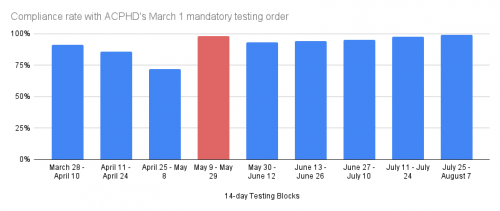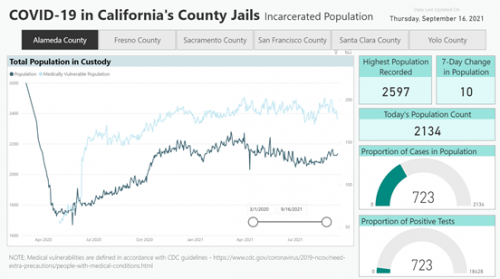
By Tiffany Devlin & Aparna Komarla
The Covid In-Custody Project partners with the Davis Vanguard to bring reporting on the pandemic’s impact on correctional facilities to the public eye. This is our monthly report on developments in Santa Rita Jail’s COVID-19 response. Visit our website to view and download raw data on cases, testing, releases and vaccinations.
ALAMEDA, CA— There has been a surge of COVID-19 cases at Santa Rita Jail (SRJ) managed by the Alameda County Sheriff’s Office (ACSO) over the past month, reflecting trends in cases among the general county population. The jail has the lowest vaccination rate among all the counties the Covid In-Custody Project tracks — only 25% of incarcerated people are fully vaccinated.
Since the beginning of August, 14 jail staff members and 46 residents have contracted COVID-19. Of these, 12 cases in the jail population are active.
Weekly testing rates have been high as 31 housing units are undergoing surveillance testing. The medical provider for the jail, Wellpath, has tested between 15 to 20 percent of the population in the last two weeks.
Jail News
SRJ Solidarity Hotline Coordinator Lina Garcia-Schmidt expressed concern to Wellpath officials that newly booked individuals were not being housed in single-cells during the intake quarantine period. During the 14-day mandatory intake quarantine period, those who consent to a test are awaiting their results. In an instance brought to Garcia-Schmidt’s attention through the hotline, a caller had been housed with someone who tested positive.
While the recommendation by the CDC for individuals in a quarantined area is to house them in single-cells, Mike Durbin, Health Services Administrator for Wellpath stated that under the same guidance, if space is unavailable, dual-cell occupancy is permitted in congregate settings.
Settlement in Babu v. Ahern
In 2018, attorneys from Rosen, Bien, Galvan & Grunfeld (RBGG) filed a class-action lawsuit, Babu v. Ahern, on behalf of incarcerated people with serious mental illnesses incarcerated at SRJ. The case shows that even before the pandemic, the ACSO’s poor protocols and medical neglect caused severe mental health crises in those with pre-existing mental illnesses.
The plaintiffs allege that, “people with psychiatric disabilities are being held in isolation in small, filthy cells for 23 to 24 hours per day with little or no treatment, resulting in deaths and terrible suffering.”
On Aug. 26, plaintiffs’ legal counsel at Rosen Bien Galvan & Grunfeld (RBGG) filed a motion seeking preliminary approval of a Consent Decree for SRJ in regards to the jail’s mental health care.
“The Decree requires fundamental and transformative changes at the Jail,” Jeffrey Bornstein, a partner at RBGG explained.
A recent DOJ report revealed that SRJ violates the ADA by not only denying services to those with mental health disabilities, but also failing to provide constitutionally adequate services to those with serious mental health needs, including those at risk for suicide.
The report also states that SRJ’s use of prolonged restrictive housing, by which individuals have very limited out-of-cell time, is a violation of their Eighth and Fourteenth Amendment rights.
“The jail is not set up for people in a mental health crisis,” Janssen said in an interview with KTVU previously. “There is a large issue for the county to create a system of connecting these people with services and putting them in isolation isn’t the answer.”
“There has been no meaningful mental health care treatment in the Jail for many years,” added Kara Janssen, senior counsel at RBGG. “The Consent Decree mandates comprehensive mental health services including, regular mental health rounds, electronic tracking of referrals, prompt delivery of medication, group therapy, treatment planning teams, creation of confidential spaces for services, and discharge planning including coordinating with community-based mental health services.”
The Motion for Preliminary Approval is presently set for hearing on September 22 before United States Magistrate Judge Nathanael Cousins. If the motion is preliminarily approved, the Court will set a date for a hearing on final approval.
If the settlement is approved, the County will be required to ensure that everyone in the jail is receiving adequate medical care. They must also ensure that people in the jail are offered adequate out-of-cell time every day, increasing the amount of out-of-cell time offered within three months of the effective date.
The jail will also be required to take measures to prevent suicide and self-harm inside the jails, ensure that individuals with mental health disabilities can access services and programs consistent with their classification levels, coordinate care for those in crises, among many more.
Vaccination progress for jail population
ACSO first began administering vaccinations to those with underlying medical conditions and comorbidities on March 1. Since then, vaccines have been offered to other parts of the jail population.
As of Aug. 26, 933 individuals were given the single dose J&J vaccine or both doses of the Moderna vaccine while in custody. Only 532 of them remain in custody, i.e. roughly 25 percent of the current population is fully vaccinated.
113 individuals have received one dose of the Moderna vaccine, of which only 37 remain in custody, i.e. roughly less than 2 percent of the current population is partially vaccinated.
Residents in HU 1 ABCEF, HU 2 – 4, HU 6 – 9, HU 21 ACDEF, HU 24 – 25, HU 31 – 34, and Outpatient Housing Unit (OPHU) have been offered vaccines so far.
The population in these HUs changes frequently due to transfers, releases and intake. Because of this, there may be new residents in these units who have not been offered the vaccine yet.
See visualizations for the breakdown of vaccine uptake by gender, ethnicity and age here.
Cases & testing for jail staff
142 staff/contractor cases have been recorded since the pandemic emerged, of which 139 have recovered. There are currently three positive cases. At one point in August, there were as high as 16 cases on a single day.
On March 1, the Alameda County Health Officer issued a mandatory testing order for all ACSO employees who work at SRJ after multiple failures from ACSO to comply with the Public Health Dept.’s recommendation to test 100 percent of staff per month or 25 percent of staff per week. Under the order, all ACSO employees who are permanently assigned to SRJ or work there on mandatory overtime, are required to get tested every 14-days.
By issuing a mandatory testing order, Alameda County joined San Francisco and Santa Clara counties in taking a positive step forward to curtail transmission between jail staff and incarcerated people. However, no state-wide testing requirements were issued for jail staff until July — all testing mandates that were in place had been issued by local county Public Health Depts.
On July 26, the California Department of Public Health (CDPH) issued a weekly mandatory testing order for staff who work in jails and prisons. According to the order, high-risk congregate settings such as correctional facilities, must verify the vaccine status of all workers, and the records of vaccination verification must be made available to the local health jurisdiction for purposes of case investigation by Aug. 23. Further, unvaccinated or incompletely vaccinated workers are required to undergo screening testing at least once a week. Those who are fully vaccinated are exempt.
The July 26 health order overrides the mandatory testing requirement issued by the Alameda County Health Officer, and as a result, the latter has been modified. Currently, the ACSO is identifying unvaccinated staff members through HR and requiring them to get tested every seven days. Counties were expected to achieve full compliance by Aug. 23.
Here is a graph of the compliance rates for all of the 14-day testing cycles.

Another more recent Public Health Officer Order issued on Aug. 19, requires that medical staff in correctional facilities that provide in-house healthcare must be fully vaccinated by Oct. 14. Since SRJ provides in-house healthcare, Wellpath staff will be required to comply. Further, some deputies who are present in medical settings of the jail will be required to get vaccinated.
Vaccination progress for jail staff
Based on self-reported vaccination cards ACSO staff members submitted to HR, out of 1722 total ACSO staff, only 456 or 26% are fully vaccinated. Even more concerning is the custody division’s vaccination rate. Of the 746 staff permanently assigned to the jail, only 77 or 10% are fully vaccinated. There are 448 sworn staff from other duty stations who work at the jail on mandatory over-time, however they are not included in the custody division vaccination rate.
Through the CA Immunization Registry (CAIR), the Public Health Dept. matched 56.6% of the ACSO roster with records of individuals in any California county who received at least one dose and 39.4 % with records of fully vaccinated individuals, as of May 30.
The 26% vaccination rate for ACSO staff comes from self-reported vaccination statuses submitted to HR, and is likely an undercount, as it deviates significantly from the 39% fully vaccinated rate reported through the CAIR data. Nevertheless, both vaccination rates are extremely low.
All staff have been urged to submit their vaccination cards and are given consistent reminders, according to Captain Luckett-Fahimi. If individuals are not providing their vaccination cards to HR or are unvaccinated, they are required to submit to weekly testing under the July 26 CDPH health order.
According to Kimi Watkins-Tartt, director of Alameda County’s Public Health Dept., since the July 26 order was issued by the state, her department cannot enforce or monitor the implementation. Instead, the Sheriff’s Office Human Resources will be responsible for tracking the vaccination status of all staff. She also stated that her department will be requesting monthly reports in order to track the Sheriff’s compliance with the order.
The Covid In-Custody Project recently uncovered that the first bi-weekly testing requirement issued by the county’s health officer cost approximately $36,000 per month. The Sheriff is attempting to utilize the Coronavirus Emergency Supplemental Funding (CESF) grant of $1 million to cover the expenditure.
If the vaccination rate does not improve, the cost of implementing the new weekly testing requirement may be double, i.e. anywhere between $60,000 to $70,000 per month. Such a cost could be avoided if the majority of staff were vaccinated voluntarily or through a mandate.
Testing Report
From Aug. 17 to Aug. 30, approximately 729 tests have been administered at intake or in custody, of which 148 are pending results. Approximately 37 percent of the jail was tested in the last two weeks and 19 percent in the past week. Higher testing rates may be attributed to ongoing surveillance testing.
In the past month, roughly 65 percent of the jail population was tested.
Between July 25 to Aug. 7, the testing refusal rate for new books during the intake process was 48%. 328 out of 632 eligible individuals consented to a test.
The refusal rate for expanded testing— conducted for patients with medical vulnerabilities, residents in open air units, and kitchen or laundry workers— is 55%. 125 out of 279 eligible individuals have consented to a test.
There was a 45% refusal rate in quarantined housing units subjected to surveillance testing. During this period, HU 21 A, B, and C were undergoing surveillance testing from July 16 to Aug. 1.
Population Report
As of Sept. 14, there were 2124 in custody. As seen in the graph below, the population has gradually decreased since April.

Data collected by the Covid In-Custody Project, shows that there is a correlation between the drop in the number of individuals in custody pending transfer to state prisons under the CA Department of Corrections and Rehabilitation (CDCR), and the decline in SRJ’s population. In early January of this year, nearly 170 individuals in SRJ custody were pending transfer to CDCR. This number has fallen to 9 as of Sept. 17.
Housing unit quarantines
Between Aug. 17 and Aug. 30, a total of 41 housing pods were quarantined. Currently, there are 32 housing pods under quarantine, 31 of which are undergoing surveillance testing.
All of the total housing pods were quarantined for the second time in the last two months, or re-quarantined since the pandemic started.
Many of the housing units quarantined and undergoing serial testing are due to an individual testing positive for COVID-19, or because individuals inside the housing units have been exposed to someone that is positive for COVID-19.
Nine housing pods were released from quarantine during this period of time.
The Covid In-Custody Project provides data reports twice a week covering SRJ and providing statistics recorded on ACSO’s website. Here is the most recent data report, listing all housing units quarantined.




